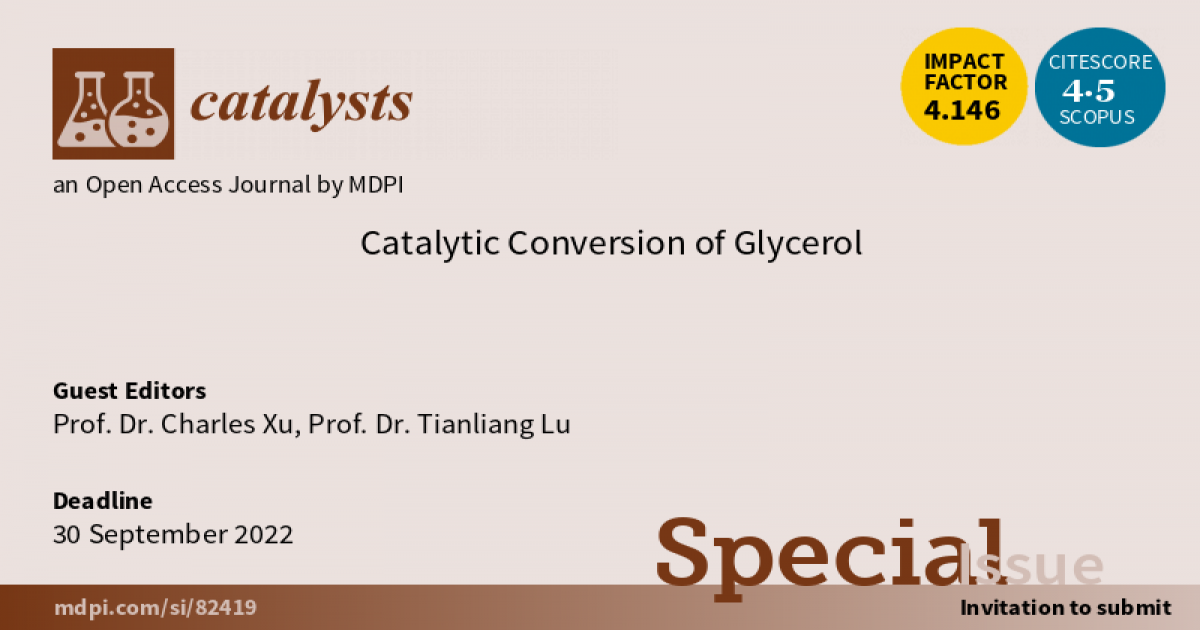Catalytic Conversion of Glycerol
A special issue of Catalysts (ISSN 2073-4344). This special issue belongs to the section "Biomass Catalysis".
Deadline for manuscript submissions: closed (10 December 2022) | Viewed by 49333

Special Issue Editors
Interests: catalytic conversion of lignocellulosic biomass for fuels; chemicals and materials; catalytic conversion of cellulose, starch or sugars into chemicals and materials; catalytic conversion of glycerol; green chemistry and engineering
Special Issues, Collections and Topics in MDPI journals
Interests: design of nano metal catalysts; heterogeneous catalytic selective oxidation; green synthesis of biomass-based fine chemicals from glycerol
Special Issues, Collections and Topics in MDPI journals
Special Issue Information
Dear Colleagues,
Glycerol is the core byproduct in the production of biodiesel. Recently, with the booming of the biodiesel industry, a huge amount of glycerol has been generated. Value-added applications of glycerol, e.g., as a low-cost raw material for chemicals and fuels, has attracted increasing attention. Due to the highly functionalized molecular structure of glycerol, it can be catalytically converted into many high-value chemicals/fuels including: citric acid, lactic acid, 1,3-dihydroxyacetone, 1,3-propanediol, 1,2-propanediol, dichloro-2-propanol, acrolein, solketal, hydrogen, ethanol, etc. To realize efficient and cost-effective production of these chemicals/fuels from glycerol, the development of proper heterogeneous catalysts or biocatalysts, and catalytic processes is essential. According to the target products, catalytic strategies for glycerol conversion can be classified into oxidation, dehydration, acetylation, esterification, reforming, reduction, etherification, ammoxidation, acetalization, gasification, etc. This Special Issue welcomes both review and original research articles on all aspects of glycerol conversion/utilization by catalysis in both heterogeneous and homogeneous systems. The potential topics include but are not limited to:
- Catalytic oxidation of glycerol;
- Catalytic dehydration of glycerol;
- Catalytic reduction of glycerol;
- Catalytic acetylation of glycerol;
- Catalytic esterification of glycerol;
- Catalytic reforming of glycerol;
- Catalytic etherification, ammoxidation or acetalization of glycerol;
- Photo-catalytic or electrocatalytic conversion of glycerol;
- Catalytic gasification of glycerol into hydrogen or syngas.
Prof. Dr. Charles Xu
Prof. Dr. Tianliang Lu
Guest Editors
Manuscript Submission Information
Manuscripts should be submitted online at www.mdpi.com by registering and logging in to this website. Once you are registered, click here to go to the submission form. Manuscripts can be submitted until the deadline. All submissions that pass pre-check are peer-reviewed. Accepted papers will be published continuously in the journal (as soon as accepted) and will be listed together on the special issue website. Research articles, review articles as well as short communications are invited. For planned papers, a title and short abstract (about 100 words) can be sent to the Editorial Office for announcement on this website.
Submitted manuscripts should not have been published previously, nor be under consideration for publication elsewhere (except conference proceedings papers). All manuscripts are thoroughly refereed through a single-blind peer-review process. A guide for authors and other relevant information for submission of manuscripts is available on the Instructions for Authors page. Catalysts is an international peer-reviewed open access monthly journal published by MDPI.
Please visit the Instructions for Authors page before submitting a manuscript. The Article Processing Charge (APC) for publication in this open access journal is 2200 CHF (Swiss Francs). Submitted papers should be well formatted and use good English. Authors may use MDPI's English editing service prior to publication or during author revisions.
Keywords
- Glycerol conversion
- Chemicals and fuels
- Catalytic oxidation
- Catalytic dehydration
- Catalytic reduction
- Catalytic acetylation
- Catalytic esterification
- Catalytic reforming
- Catalytic etherification
- Catalytic ammoxidation
- Catalytic acetalization
- Photo-catalytic conversion
- Electrocatalytic conversion
- Catalytic gasification.
Benefits of Publishing in a Special Issue
- Ease of navigation: Grouping papers by topic helps scholars navigate broad scope journals more efficiently.
- Greater discoverability: Special Issues support the reach and impact of scientific research. Articles in Special Issues are more discoverable and cited more frequently.
- Expansion of research network: Special Issues facilitate connections among authors, fostering scientific collaborations.
- External promotion: Articles in Special Issues are often promoted through the journal's social media, increasing their visibility.
- e-Book format: Special Issues with more than 10 articles can be published as dedicated e-books, ensuring wide and rapid dissemination.
Further information on MDPI's Special Issue polices can be found here.






